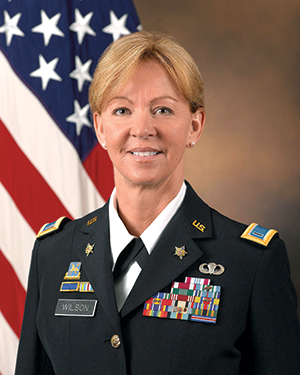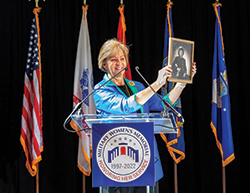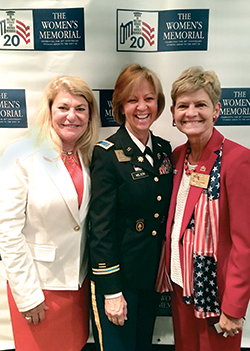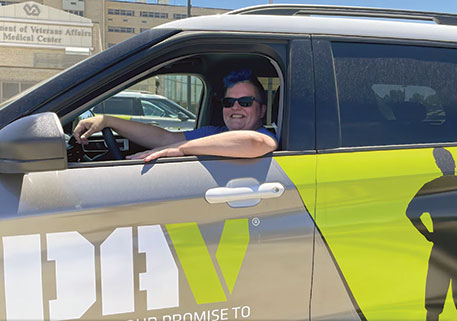
Over her 37-year Army career, Phyllis Wilson didn’t think much about being a woman in a male-dominated field. She was simply a soldier.
Then a few years ago, a man called her out for parking in a veteran-dedicated space. He had no idea he was scolding a retired chief warrant officer five, combat veteran and DAV member.
“I went into the grocery store and I thought, you know, 3 million of us [women] have served, and we’re still getting challenged on parking in a veteran parking space?” Wilson said. “That was just enough.”
That moment ultimately led to Wilson becoming the president of the Women in Military Service for America Memorial Foundation, which manages the Military Women’s Memorial—the only major national memorial honoring women veterans from the Revolutionary War to today.
It’s the kind of role that would be the crowning achievement of any career, but for Wilson, it’s just one chapter of an exceptional story of service.
“I’m 62. I still don’t know what I want to be when I grow up,” Wilson said. “I think that’s the best way to go about life—keep looking for new things that interest you.”
Her thirst for opportunity, along with the mission and camaraderie among soldiers, kept her in the military for nearly four decades. It started with a four-year enlistment to help pay for college, along with a desire to learn another language. Her first assignment after graduating from the Defense Language Institute was as a military intelligence voice intercept operator based in Germany.
“My job was to sit with headphones and listen to East German military and some East German leadership on my headphones, eavesdropping,” Wilson said.
After her enlistment, she returned stateside and had two sons with her then-husband, who was on active duty. With a growing family, Wilson decided to join the Army Reserve and pursue a degree in nursing. By 1990, she was activated in support of the Persian Gulf War and remained at Fort Bragg, North Carolina, for three years.


Then came the date that inspired countless enlistments and forever marked military careers.
“After 9/11 … [I thought,] put me in, coach. This is what I’ve been training for. Let me do something,” Wilson said. “So when that chance came, I jumped at it and never looked back.”
In 2002, Wilson served with Joint Special Operations Command, hunting the likes of Osama bin Laden and Ayman al-Zawahiri. Members of her small team worked seven days a week, often sleeping at their desks, determined to find those responsible for the deadliest attack on American soil.
“You can’t get that kind of adrenaline rush … anyplace else,” she said. “And then to be sent overseas into combat zones and try to make sense of the intelligence that’s coming off the battlefield—almost near simultaneously—that’s a really great opportunity … and that was not lost on me.”
By 2010, Wilson was on full-time active duty. In 2012, she became command chief warrant officer of the United States Army Reserve, helping manage an organization of more than 200,000 personnel. In 2018, after 37 years of a career she never expected, Wilson retired. She left with three associate degrees, two bachelor’s degrees and two master’s degrees, along with decades of world-class training and a travel record that includes more than 35 countries.
“The only thing left now for me is a Ph.D.,” she said.
For her distinguished service, Wilson has received numerous recognitions, including the Meritorious Service Medal, Joint Service Commendation and Achievement medals, Iraq Campaign Medal, and Global War on Terrorism Expeditionary and Service medals.
“Phyllis Wilson is an extraordinary woman and an inspiration to all those who have served,” said National Legislative Director and Army veteran Joy Ilem. “As a DAV member, Phyllis knows firsthand the impact of wartime service and encourages veterans to get the help and support they need to recover and lead fulfilling lives.
“She’s also a tireless advocate for our nation’s women veterans. As the president of the Women in Military Service for America Foundation, she is dedicated to ensuring the American people recognize the invaluable contributions women have made in service to our country.”


The Military Women’s Memorial, which includes an education center with interactive exhibits and special collections, is an imposing semicircle of granite that acts as the gateway to Arlington National Cemetery. The foundation also collects stories of women veterans in an online registry.
While Wilson champions the legacies of the millions of women who have served, her own is taking root not just in awards and decorations but also in her eight children—including four sons who carried her last name through combat—and 14 grandkids.
Perhaps even more notable, her story isn’t close to finished.
“Write as many chapters to your life as you need to have,” Wilson said. “I plan on having quite a few more.”





